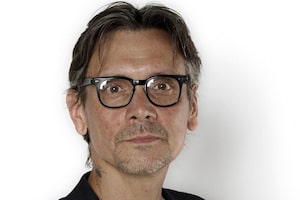The Act of Killing Release: This documentary, executive-produced by Errol Morris and Werner Herzog, explores a dark chapter of Indonesia’s history by enlisting a group of former paramilitaries to re-enact their crimes in the style of the Hollywood films that they love.
When we meet Indonesia's Anwar Congo, he demonstrates how he used to come out of a Hollywood movie singing and dancing – and how that would put him in the mood to do the night's killing. He did it a thousand times or so, often with a song in his heart. Welcome to The Act of Killing, one of the year's most unnerving and radical movies.
It's a documentary about the victims of a genocide but largely excludes the victims; a portrait of mass murderers that permits them to make a movie about themselves; and a powerhouse account of how the process of recreating history compels Anwar Congo to see the blackness of his own soul. Directors Joshua Oppenheimer and Christine Cynn basically restore horror to the otherwise benumbed historical narratives of genocide – by letting the killers create their own narrative.
Originating as a film about the victims of mass killings that followed the toppling of the Indonesian government in 1965, it became something else entirely when Oppenheimer realized the killers were far more willing to speak freely about the past than the victims. And so the movie's conceptual masterstroke: Oppenheimer asked the likes of Anwar Congo and his cronies to make movies about their communist-exterminating days in any form or genre they wished, and much of The Act of Killing involves watching these men plan, rehearse, act out and screen these films.
To understand why the making of self-starring movies is an especially appropriate suggestion in the case of Anwar Congo, it helps to know a bit about his gangster beginnings.
When a military coup overthrew the Sukarno government, Anwar Congo was lured from his job as a scalper of movie tickets to kill so-called "communists." Among the many stated reasons why communists (which really meant anybody the government didn't care for or whomever the squads felt like killing) needed to be exterminated was the fact they had banned the showing of Hollywood movies, which might have been the only thing Anwar Congo loved more than killing.
Over the course of the film, he not only speaks frankly and meticulously about his history as a mass-murdering state thug – it's estimated that at least half a million people died in the two years following the coup – he helpfully demonstrates the cleanest way to kill someone with chicken wire looped on a stick. When you had to kill as much as he did, it helped to have the right tools.
But Anwar Congo, surrounded by cronies who have never been punished and, in fact, are figures of swaggering celebrity in Indonesia, isn't just describing his actions, he's making a movie about what he did – and this is where The Act of Killing lifts off into the stratosphere of documentary practice. Ultimately, what we're watching is the process by which politically backed mass murder is not only justified but mythologized by its perpetrators, who see themselves as stars in a surreal spectacle in which history is the story they choose to tell – and how they choose to tell it. And if the movie they make is part-gangster drama, part-western and even part-musical in which Anwar Congo's victims welcome him to heaven in gratitude for sending them there (set to the tune of Born Free), so much the better. It's their movie; they've got final cut.
At first Anwar Congo delights in playing a Hollywood version of himself. He sings, he dances, he wears cowboy hats and speaks proudly of his expertise in the art of killing. At one point, he criticizes his performance: "I never killed in white pants." But as the production proceeds, he begins to look more haunted and hesitant, reaching a point where he plays a victim in a scene and can't even stand up afterward. By making the movie version of his life, he seems to be facing something like the truth.
He gets immersed in increasingly surreal re-enactments of his past and begins to feel the weight of what he's done – to the point where he tells Oppenheimer that he's beginning to feel exactly as his victims did. To which the filmmaker properly responds that there's a difference: Anwar Congo knows he's in a movie. His victims knew they were going to die.
In one of this thoroughly remarkable movie's most thoroughly remarkable scenes, Anwar Congo returns to the rooftop pen where he did most of his killing. He starts to convulse, heaving and retching as though trying to throw up his own soul – or maybe disgorge the memory of every one of his victims. But he can't. Nothing comes up, and there are too many dead. But you know he's feeling every one, and so can we.
When Hannah Arendt so famously formulated the idea of the banality of evil, she was of course referring to the machinery of mass murder as represented by the bland Nazi Adolf Eichmann, but the idea also pertains here as a description of a society saturated by pop culture and inured to depictions of killing. As we watch Anwar Congo and his gang make their bizarre little movie – replete with terrible makeup, egregiously bad acting and even ample Pink Flamingos-style cross-dressing – and as the process provides a catalyst for the man's catastrophic reckoning with his own guilt, evil somehow acquires a fresh face. Naturally, it's only too terrifyingly human.
 Geoff Pevere
Geoff Pevere